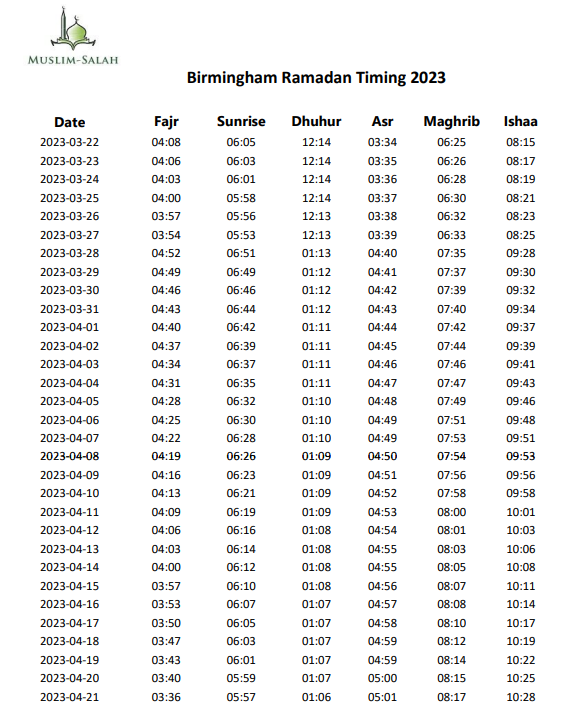Ramadan Timetable Birmingham 2023
Birmingham Ramadan Timetable 2023
Birmingham Ramadan Timetable 2023 provides you the latest information on Birmingham Sahur times and Birmingham iftar times. With the Birmingham Ramadan Timetable 2023 you can find out the prayer times on a daily basis.

Ramadan Timetable 2023 in Birmingham
Alhamdulillah! The blessed month of Ramadan is coming again with all its blessings. Muslim brothers and sisters around the world have been looking forward to this month to worship Almighty Allah and to experience the spirit of the blessed month of Ramadan.
What time is iftar in Birmingham today?
The holy month of Ramadan comes to bless the Islamic world with its spiritual beauties. In this blessed month, believers practice fasting.
„What time is Sahur in Birmingham? Our brothers and sisters who are curious about answers to questions like“ What time is Iftar in Birmingham? „, can download the Ramadan schedule on their computer or phone.
When is Ramadan 2023 in Birmingham?
Ramadan is approaching, the holy month of worship when Muslims gather at iftar tables and homes are filled with peace and prosperity. This year, Ramadan 2023 begins on March 22, 2023 and ends on April 21, 2023
- First Day of Ramadan: Wednesday, March 22
- Last Day of Ramadan: Friday, April 21
- Eid al-Fitr Day 1: Saturday, April 22
- Eid al-Fitr Day 2: Sunday, April 23
- Eid al-Fitr Day 3: Monday, April 24
Importance of Ramadan
The month of Ramadan, together with the preceding months of Rajab and Shaaban, constitute three special months in which fasting, remembrance of the Creator, and good deeds toward fellow human beings are important. The months of Rajab and Shaaban serve especially to prepare for the fasting month of Ramadan.
Thus, according to a tradition of Muhammad on al-Bukhari, „Rajab is the month of Allah, Shaaban is my month, and Ramadan is the month of my community.“ Furthermore, a supplication of the Prophet states, „O Allah, bless the months of Rajab and Shaaban and guide us into Ramadan.“
Imam Abu Bakr al-Warraq said, „In the month of Rajab you plant the seed, in Sha’ban you water it, and in Ramadan you reap the yield.“
According to numerous traditions, the Prophet used to fast more in the month of Rajab and especially in the month of Sha’ban because, according to Islamic tradition, in this month the deeds of those who fasted were lifted up to God. However, Ramadan was the only month that the Prophet fasted completely, which highlights the difference between the obligatory fasting in Ramadan and the voluntary fasting in Rajab, Shaaban and the other months.
Fasting with the renunciation of food and stimulants for several hours, the additional prayers (salat at-tarawih) and the recitation of the Quran are the focus of this month – as are the prayers of supplication and good deeds towards fellow human beings, which, according to Islamic beliefs, are heard and rewarded many times over during this month. The fasting month of Ramadan is therefore considered a particularly holy month and is characterized by intensive piety. In addition to the intensive study of the Koran and the careful observance of prayer times, special emphasis is placed, for example, on instructing young Muslims in the practice of the faith. In this month, Muslims try to live a particularly compassionate behavior in everyday interaction as well as to support needy fellow human beings through donations and good deeds.
Dua for Breaking Fast
اللَّهُمَّ لَكَ صُمْتُ وَ عَلَى رِزْقِكَ أَفْطَرْتُ وَ عَلَيْكَ تَوَكَّلْتُ
Allaahumma Laka S’umtu Wa A’laa Rizqika Aft’artuwa A’layka Tawawkkaltu
O my Allah, for Thee, I fast, and with the food Thou gives me I break the fast, and I rely on Thee.
